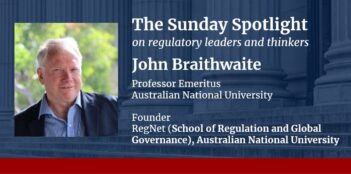
Experts address the promise and potential limitations of gun control measures.
Parkland. Sutherland Springs. Las Vegas. Newtown. And now Pittsburgh and Thousand Oaks.
Recent—and recurring—mass shootings across the United States have generated repeated public outcry for tighter gun regulation.
And policymakers across the political spectrum have responded—but in very different ways. Some state and federal officials have pushed for laws restricting the use of guns, while proponents of gun rights continue to argue that the right to self-defense outweighs the need for gun control. A deep divide remains about whether and how to regulate guns in the United States.
Against this backdrop, The Regulatory Review has brought together leading experts to consider the prospects for and potential limitations of gun control regulation. Contributors to this series include the nation’s foremost academic researchers on criminal justice. Rather than just exchanging political slogans or rehashing well-trodden debates, the essays in this series bring data and research-based perspectives to bear in considering alternative regulatory options and their likely efficacy in reducing mass shootings and other violent crime.
The contributors to this series are: David Abrams, a professor at the University of Pennsylvania Law School; Joseph Blocher, a professor at Duke University School of Law; Anthony A. Braga, a professor at Northeastern University; Philip J. Cook, a professor at the Sanford School of Public Policy at Duke University; Jennifer Doleac, a professor at Texas A&M University; James B. Jacobs, a professor at the New York University School of Law; David B. Kopel, a policy analyst at the Cato Institute; Amanda LeSavage, a student at the University of Pennsylvania Law School; Jens Ludwig, a professor at the University of Chicago; Darrell A. H. Miller, a professor at Duke University School of Law; and Robert J. Spitzer, a professor at the State University of New York College in Cortland.
Guns Do Kill People
November 5, 2018 | Anthony A. Braga, Northeastern University, and Philip J. Cook, Duke University
The argument that “guns don’t kill people, people kill people” suggests that gun control would do little to change homicide rates as the intent of the killer matters much more than the weapon. Compelling evidence demonstrates that this view is false and that the type of weapon used is highly influential in determining whether the victim of an assault lives or dies.
Effective Gun Control Can Be Compatible with Gun Rights
November 6, 2018 | Robert J. Spitzer, SUNY Cortland
Legitimate gun rights and practices are best protected when law breakers and cheaters are effectively regulated and prosecuted. Ineffective or impotent regulation only undermines the integrity of law-abiding gun dealers and owners.
Limitations of Federal Gun Regulation
November 7, 2018 | James B. Jacobs, NYU Law School
With 300 million firearms in private hands, preventing “dangerous individuals” from acquiring guns is a formidable regulatory challenge. The federal government’s scheme is incomplete and falls far short, but whether it can be fixed is an open question.
What Firearms Law and Regulatory Scholarship Can Learn from Each Other
November 8, 2018 | Joseph Blocher, Duke University, and Darrell A.H. Miller, Duke University
Few regulatory issues are subject to more political rhetoric or active litigation than guns. As firearms law begins to solidify into something like a scholarly field, it will increasingly come into contact with adjacent fields like regulation, sparking a conversation that could benefit both.
Gun Regulation is Costly—And Not the Only Option
November 9, 2018 | Jennifer Doleac, Texas A&M
In the war over gun deaths, vast armies have gathered to contest gun regulations, a territory of uncertain value. Meanwhile, other policies of clear value are available and their opportunities are virtually untapped.
A Call to Arms Research
November 12, 2018 | David S. Abrams, University of Pennsylvania Law School
After a spate of horrific mass shootings, Americans are ready to deal with their gun problem. With greater data collection, careful weighing of costs and benefits and the use of taxes and regulation, this country can become safer without eliminating guns.
The Economic Approach to Evaluating Gun Control Policies
November 13, 2018 | Philip J. Cook, Duke University, and Jens Ludwig, University of Chicago
Economics offers a framework for defining and assessing the problem of gun violence that is quite different than public health. We submit that the economic framework for valuation is more comprehensive than the public health framework, and provides greater insight into how the public feels, votes, and acts when it comes to gun violence.
Defining “Assault Weapons”
November 14, 2018 | David B. Kopel, Cato Institute
Responsible regulation requires accurate definition. The term “assault weapon” has never had a stable meaning and is just an epithet to stigmatize the largest possible number of guns and gun owners.
Reducing Information Asymmetry in the American Gun Market
November 15, 2018 | Amanda LeSavage, University of Pennsylvania Law School
Gun consumers’ lack of awareness about the severe dangers of gun ownership impairs their ability to make informed decisions on whether to bring guns into their homes. Congress must pass legislation that will provide the Consumer Product Safety Commission with jurisdiction over guns and require the agency to craft mandatory disclosure requirements for gun manufacturers.



